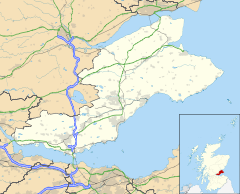Lochgelly
Lochgelly
|
|
|---|---|
 Lochgelly in November 2008 |
|
| Lochgelly shown within Fife | |
| Population | 6,834 |
| OS grid reference | NT186936 |
| Council area | |
| Lieutenancy area | |
| Country | Scotland |
| Sovereign state | United Kingdom |
| Post town | LOCHGELLY |
| Postcode district | KY5 |
| Dialling code | 01592 |
| EU Parliament | Scotland |
| UK Parliament | |
| Scottish Parliament | |
Lochgelly (![]() listen ; Gaelic: Loch Gheallaidh) is a town in Fife, Scotland. It is located between Lochs Ore and Gelly to the north-west and south-east respectively. It is separated from Cowdenbeath by the village of Lumphinnans. According to the 2007 population estimate, the town has a population of 6,834.
listen ; Gaelic: Loch Gheallaidh) is a town in Fife, Scotland. It is located between Lochs Ore and Gelly to the north-west and south-east respectively. It is separated from Cowdenbeath by the village of Lumphinnans. According to the 2007 population estimate, the town has a population of 6,834.
From the 1830s until the 1960s Lochgelly was a mining town. With the industry now dead the town has slipped into economic and social deprivation as with other former mining towns. Lochgelly is now classed as town in need of regeneration "economically and socially" and has the cheapest average home price in Britain.
Lochgelly, as part of the old parliamentary constituency of West Fife, was known as "Little Moscow" up to the 1950s owing to its Communist political leanings.
An area of Lochgelly was known as the Happy Lands (or Happy Valley) and is referenced in the Scottish folk song 'The Kelty Clippie'.
The town is served by Lochgelly railway station on the line between Edinburgh and Markinch.
In the 1970s new investment was brought in the form of a factory and development office built by the Andrew Corporation. This created microwave antennae under the banner of Andrew Antennas, symbolised by a red lighting flash on the dishes they made. These dishes were primarily for commercial and military usage. The firm located at the end of "The Avenue" on the south-east side of the village. Adjoining fields were used for testing new equipment.
Lochgelly is also the home of the most reputed firm that produced tawses, John Dick (Saddlers), and was hence a synonym for that typically Scottish device for corporal punishment.
...
Wikipedia

